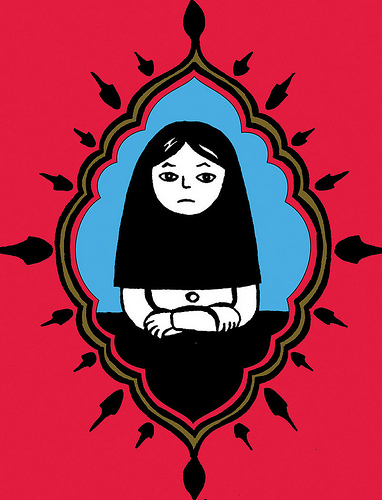
 The United States’ third-largest school district, Chicago Public Schools, denies that it banned the book, saying that it “only removed copies from classrooms.” They can euphemize it any way they like, but it’s still censorship.
The United States’ third-largest school district, Chicago Public Schools, denies that it banned the book, saying that it “only removed copies from classrooms.” They can euphemize it any way they like, but it’s still censorship.
Labeling the graphic novel as “inappropriate,” CEO Barbara Byrd-Bennett also ordered mandatory training for any high school teacher who wishes to continue using the illustrated story of Marjane Satrapi growing up in revolutionary Iran “due to the powerful images of torture in the book,” she stated in an email sent on March 13th to all CPS principals.
The CPS Office of Communications has refused to explain to the public or the press how this incident took place, why Persepolis has suddenly become controversial after being read by thousands of teachers and students since its publication, and has even refused to confirm that the censorship order had gone out at all. Luckily, for you, my dear readers, you can view a screenshot of the email here.
This just so happens- perhaps coincidentally, perhaps not- to also come on the eve of a massive closing of many of the district’s schools.
Satrapi, who is in Germany, criticized the district for pulling a book that has been approved for use in their schools for nearly a decade and for requiring “special training” for teachers. “For me, the worst in all of that is it’s absolutely the biggest insult to the intelligence of the teachers,” she said last week to the Chicago Sun Times.
She has visited Chicago several times, including a 2004 trip when she signed copies of Persepolis at some CPS schools; so Satrapi couldn’t believe problems arose in the district saying, “Even in Texas I didn’t have trouble with [it].”
The book is Satrapi’s illustrated recollection as a child and teenager during the Iranian Revolution; the 2007 animated film version won awards and critical acclaim.
On its own website, CPS even lists Persepolis as a good resource in the 2012-2013 Literacy Content Framework for seventh graders, along with Sandra Cisneros’ The House on Mango Street; also listed is Charlotte Bronte’s Jane Eyre for 11th graders.
So what changed?
The book was removed after agreeing with a complaint from a teacher and principal in the Austin-North Lawndale network.
Lane Technical High school students waved signs along Western Avenue after school on March 15th, chanting, “No more banned books!” and “Let us read!” as they stood amid freezing rain. Several said they had already read Persepolis as seventh graders.
No parents have complained about the book either, according to Valerie Mason, who has taught Persepolis at Lane Tech for the last five years to 11th and 12th graders. In fact, many parents have asked to borrow copies after talking with their children about the graphic novel.
Student Katie McDermott didn’t see the language or images as problematic because the class had a guide for discussions.
“If we don’t create opinions, we won’t have individualism,” McDermott said. “If (students) can’t voice themselves, then we won’t have a country that’s individualistic,” said the 18-year-old, who helped organize the student protest.
Junior Matthew Wettig even contacted Satrapi for the school paper, The Lane Warrior.
“I didn’t know how she could possibly know about it,” he said. “So I just thought not only it’s my duty as a human being but as a journalist to shed light to her on the situation.”
Members of the American Library Association and the Freedom to Read Foundation joined the protest.
The Chicago-based ALA, in a letter to Byrd-Bennett, Chicago Board of Education President David Vitale, and Chicago Mayor Rahm Emanuel, expressed its ethical and legal concerns regarding the situation and asked for an explanation for the policy change.
The Chicago Teachers Union also expressed its surprise over the ban.
“The only place we’ve heard of this book being banned is in Iran,” CTU financial secretary Kristine Mayle wrote in a statement. “We understand why the district would be afraid of a book like this, because it’s about questioning authority, class structures, racism, and gender issues.”
According to additional comments to the CTU’s press release, the district is now claiming that Persepolis is banned “only from seventh grade classrooms but will be available in school libraries,” but the hidden catch is that 160 of its schools don’t have libraries- “and they know that,” said CTU spokeswoman Stephanie Gadlin.
For more information on the Banned Books Awareness and Reading for Knowledge project and the complete list of titles covered, please visit the official website at http://bbark.deepforestproductions.com/
Sources: Chicago Sun Times, Daily KOS
© 2013 R. Wolf Baldassarro/Deep Forest Productions

Persepolis is under fire again. In a letter sent to the Ball-Chatham Board of Education today, NCAC and other free-speech organizations urged the Board to reinstate Marjane Satrapi’s acclaimed Persepolis to the 12th grade English IV curriculum in Glenwood High School. The Board will meet tonight to make a final decision on the issue. http://ncac.org/incident/persepolis-under-attack-at-glenwood-high-school-school-board-to-meet-tonight/
Victory for free speech! Glenwood High School to reinstate Persepolis to 12th grade classrooms. Read the letter here: http://t.co/M0Wt4id7ak